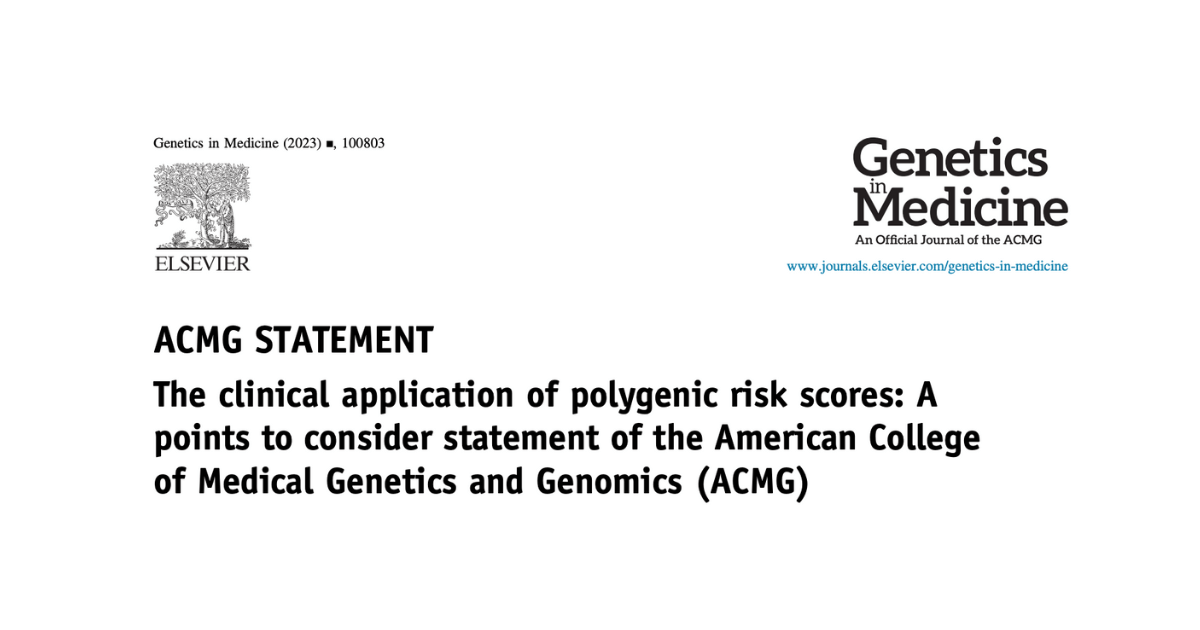The American College of Medical Genetics and Genomics (ACMG) has recently published two statements on the clinical application of polygenic risk scores:
- The clinical application of polygenic risk scores: A points to consider statement of the American College of Medical Genetics and Genomics (ACMG) (1).
- Laboratory perspectives in the development of polygenic risk scores for disease: A points to consider statement of the American College of Medical Genetics and Genomics (ACMG) (2).
The ACMG offers a thorough discussion of points to consider in the clinical application of PRS. Antegenes strongly welcomes this initiative by the eminent organization of leading professionals in the field and sees these documents as a crucial step on the path toward the establishment of generally accepted best practices and guidelines necessary for wide-scale clinical uptake of the PRS technology. We find that the considerations by ACMG are in excellent alignment with the guiding principles followed at Antegenes for the development and use of our polygenic risk score tests. Antegenes agrees with all points but wishes to clarify that we have already considered these circumstances, spent considerable effort to address them and found and applied solutions to them. We consider all the raised issues highly relevant and address each one below.
Points to consider for the clinical application of polygenic risk scores by ACMG and Antegenes’ responses:
- PRS test results do not provide a diagnosis, instead, they provide a statistical prediction of increased clinical risk.
- Antegenes clarifies in its test information that PRS tests cannot be used to diagnose cancer (e.g., “AnteBC test cannot be used to diagnose breast cancer”).
- A low PRS does not rule out significant risk for the disease or condition in question.
- PRS is a separate independent risk factor that characterizes one component of hereditary risk for a disease. Each disease has other risk factors that can affect the development of tumours to varying degrees. PRS operates with disease risk probabilities offering clear risk differences, not with categorical statements. Therefore yes, PRS should be used in a relevant clinical context with other risk factors. In tests’ information Antegenes always states, for example:“High risk does not necessarily mean that the patient will develop breast cancer during her lifetime.”“Moderate or lower risk does not necessarily mean that the patient will never develop breast cancer during her lifetime.”“The results of this test should be applied in combination with other relevant clinical data. In addition to genetic predisposition, other risk factors influence the risk of developing breast cancer.”
- If the risk prediction of a PRS is derived from a population that is different from the patient being tested, then the results may have a poor predictive value for the patient.
- Yes, the ethnic background should be considered. Antegenes has made analyses about PRSs performance based on the UK Biobank’s different ethnic groups data and has implemented relevant adjustments for PRS test results. Antegenes’ genetic testing process always includes specification about an ethnic group of an individual.
- Isolated PRS testing is not the appropriate test for clinical scenarios in which monogenic etiology is known or suspected.
- We agree that monogenic and PRS testing should be complementary and PRS testing without considering the possible presence of monogenic pathogenic variants is not appropriate. Antegenes always recommends also monogenic pathogenic variant testing, at least considering cancer monogenic pathogenic variant testing criteria and relevant clinical guidelines implemented in the specific country (3-7).
- Before testing, a patient and provider should discuss the indications for the PRS test, and the patient should be informed how the PRS results will be used to guide medical management.
- We agree that for PRS testing it is necessary to give full information about the PRS test, its testing purposes, its limitations of use, but also possible clinical recommendations.
- PRS-based medical management should be evidence-based; however, there is currently limited evidence to support the use of PRS to guide medical management.
- We fully agree that PRS-based medical management should be evidence-based, but we emphasize that there is already sufficient evidence for the implementation of risk-stratified cancer prevention. There are clinical guidelines for implementing risk-based prevention in breast cancer (3, 8, 9), colorectal cancer (6, 10, 11), and prostate cancer (7, 12-15), using information from monogenic pathogenic variant testing and other clinical factors. PRS as an independent risk factor gives a similar level of risk estimations in comparison with moderate risk monogenic pathogenic variants. On the other hand, it can be argued that not considering the effect of PRS in the assessment of hereditary cancer risk in the absence of monogenic pathogenic variants gives an individual an incomplete risk assessment and is no longer the best modern clinical practice.
- Clinical follow-up for PRS should be consistent with best practices outlined by professional societies with appropriate expertise in instances when and where evidence-based practice guidelines exist.
- Antegenes concurs and has developed clinical recommendations based on PRS risk levels using the information about available evidence-based professional guidelines and into the context of these guidelines.
- The ACMG’s position is that preimplantation PRS testing is not yet appropriate for clinical use and should not be offered at this time.
- Antegenes agrees and offers PRS tests for age groups where PRS risk estimations give clinically meaningful information for risk-stratified clinical recommendations about cancer type-specific prevention and screening.
Key Learning Points from ACMG:
At this time, the ACMG advocates against clinical implementation of PRS testing unless the provider and patient have a clear understanding of the limitations of the testing and applicability to the specific patient, including how the results will be used to guide evidence-based clinical care.
Antegenes’ comment:
We agree. Antegenes has considered all described limitations and has created solutions to these including relevant information, and also has created clinical recommendations for different PRS risk levels based on available evidence for prevention and screening of specific tumour types.
References:
- Abu-El-Haija A, Reddi HV, Wand H, Rose NC, Mori M, Qian E, et al. The clinical application of polygenic risk scores: A points to consider statement of the American College of Medical Genetics and Genomics (ACMG). Genet Med. 2023:100803.
- Reddi HV, Wand H, Funke B, Zimmermann MT, Lebo MS, Qian E, et al. Laboratory perspectives in the development of polygenic risk scores for disease: A points to consider statement of the American College of Medical Genetics and Genomics (ACMG). Genetics in medicine : official journal of the American College of Medical Genetics. 2023:100804.
- Sessa C, Balmana J, Bober SL, Cardoso MJ, Colombo N, Curigliano G, et al. Risk reduction and screening of cancer in hereditary breast-ovarian cancer syndromes: ESMO Clinical Practice Guideline. Ann Oncol. 2023;34(1):33-47.
- Wappenschmidt B, Hauke J, Faust U, Niederacher D, Wiesmuller L, Schmidt G, et al. Criteria of the German Consortium for Hereditary Breast and Ovarian Cancer for the Classification of Germline Sequence Variants in Risk Genes for Hereditary Breast and Ovarian Cancer. Geburtshilfe Frauenheilkd. 2020;80(4):410-29.
- Personaalmeditsiini kliinilised juhtprojektid rinnavähi ja südame-veresoonkonnahaiguste täppisennetuses. https://www.etag.ee/wp-content/uploads/2021/07/Lõpparuanne.pdf.
- Stjepanovic N, Moreira L, Carneiro F, Balaguer F, Cervantes A, Balmana J, et al. Hereditary gastrointestinal cancers: ESMO Clinical Practice Guidelines for diagnosis, treatment and follow-updagger. Ann Oncol. 2019;30(10):1558-71.
- Russo J, Giri VN. Germline testing and genetic counselling in prostate cancer. Nat Rev Urol. 2022;19(6):331-43.
- NICE. Familial breast cancer: classification, care and managing breast cancer and related risks in people with a family history of breast cancer 2019 [NICE Clinical guideline [CG164]]. Available from: https://www.nice.org.uk/guidance/cg164/chapter/recommendations#breast-cancer-risk-category.
- Rhiem K, Auber B, Briest S, Dikow N, Ditsch N, Dragicevic N, et al. Consensus Recommendations of the German Consortium for Hereditary Breast and Ovarian Cancer. Breast care (Basel, Switzerland). 2022;17(2):199-207.
- Helsingen LM, Vandvik PO, Jodal HC, Agoritsas T, Lytvyn L, Anderson JC, et al. Colorectal cancer screening with faecal immunochemical testing, sigmoidoscopy or colonoscopy: a clinical practice guideline. BMJ. 2019;367:l5515.
- Monahan KJ, Bradshaw N, Dolwani S, Desouza B, Dunlop MG, East JE, et al. Guidelines for the management of hereditary colorectal cancer from the British Society of Gastroenterology (BSG)/Association of Coloproctology of Great Britain and Ireland (ACPGBI)/United Kingdom Cancer Genetics Group (UKCGG). Gut. 2020;69(3):411-44.
- American Cancer Society Recommendations for Prostate Cancer Early Detection. 2019.
- Gandaglia G, Albers P, Abrahamsson PA, Briganti A, Catto JWF, Chapple CR, et al. Structured Population-based Prostate-specific Antigen Screening for Prostate Cancer: The European Association of Urology Position in 2019. Eur Urol. 2019;76(2):142-50.
- Van Poppel H, Roobol MJ, Chapple CR, Catto JWF, N’Dow J, Sønksen J, et al. Prostate-specific Antigen Testing as Part of a Risk-Adapted Early Detection Strategy for Prostate Cancer: European Association of Urology Position and Recommendations for 2021. Eur Urol. 2021;80(6):703-11.
- Van Poppel H, Hogenhout R, Albers P, van den Bergh RCN, Barentsz JO, Roobol MJ. A European Model for an Organised Risk-stratified Early Detection Programme for Prostate Cancer. Eur Urol Oncol. 2021;4(5):731-9.






